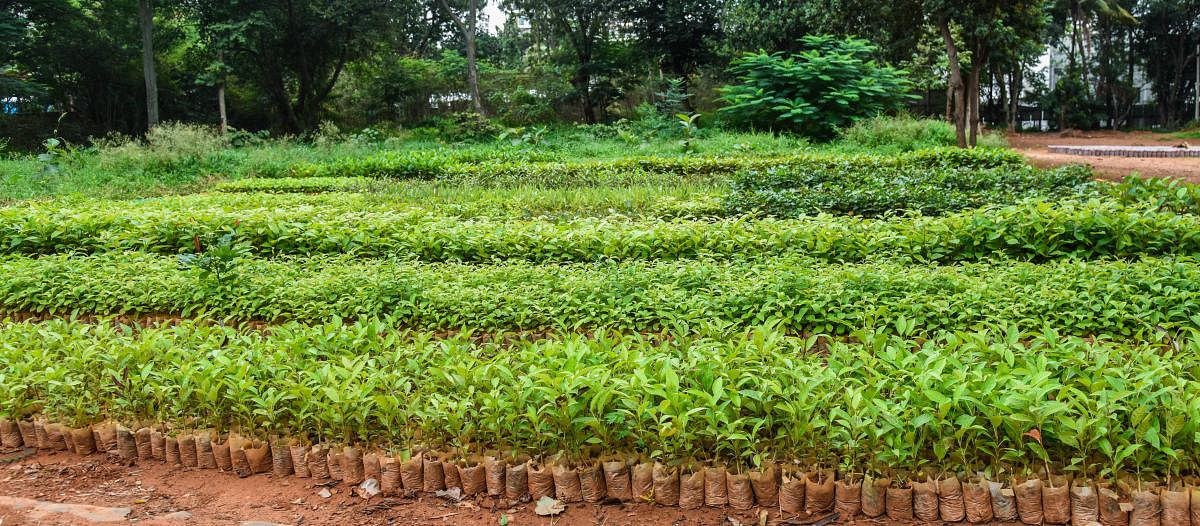
The Karnataka forest department is greening Bengaluru by giving away seedlings to citizens for as less as Re 1 and Rs 3. Students, young couples and techies are among those who approach the department for saplings.
In 2018-19, the department gave out about 50,000 saplings from a sprawling nursery in Kadugodi, near Whitefield.
The department runs five other nurseries in Bengaluru, in Hebbal, Sulikere, HAL, Hennur and Gowrenahali. The one in Kadugodi is the biggest.
Metrolife visited the Kadugodi nursery, and found workers preparing saplings for distribution.
“Simply planting a sapling won’t help. Risks are involved, such as rains and winds, and grazing cattle. We make sure the saplings survive, by growing them in our nursery and planting them till they have grown to a certain height,” explains Syed Nizamuddin, range forest officer.
The department is responsible for maintenance for up to three years. The department puts in months of effort to prepare saplings for distribution. Forest officials first prepare the soil with a carefully measured combination of manure, sand and red earth. The process takes up to a year and a half.
The seeds are usually planted between January and March in 4x6 inch bags. Once they germinate, usually around June, they are carefully transplanted into bigger bags. A year later, the saplings are ready for planting. Some plants are allowed to grow to a height of five to six feet before they are planted.
The department gives away saplings to schools and school children under the Maguvigondu Mara Shaalegondu Vana (‘a sapling for each child and a tree for every schoo’l) scheme.
“The aim is to create awareness among young children. We also encourage people to plant trees in their neighbourhood,” Nizamuddin says.
“Planting saplings has become ceremonial. Nowadays, people give them away as return gifts for guests at weddings and events. Often, it is a publicity stunt,” he says.
Just planting saplings does not mean anything. People should tend to them and make sure they grow into trees, he says.
BEST TIME
April-July: The days after the first showers of the monsoon are the best for planting.
WHY WE NEED TREES
Bengaluru, much like other cities, has been struggling with pollution. The increasing number of vehicles and construction projects are choking the city.
According to a study conducted by Ashoka Trust for Research in Ecology and Environment (ATREE), the surface water belt in the Peenya industrial area is heavily contaminated with untreated industrial effluents. The situation is dire and even the smallest efforts could go a long way in rectifying the situation. Trees help reduce air pollution.
OTHER INITIATIVES
The forest department’s social forestry wing promotes greening initiative in spaces attached to temples, schools and gram panchayats. Its territorial division, on the other hand, protects the state’s notified forests, raises plants in degraded areas, and undertakes roadside plantations in cities.
PLASTIC USE
Saplings are placed in polythene and poly-woven bags, which take anywhere between 10 and 100 years to decompose. “We are supposed to stop using plastic, but other materials would make the programme more expensive. Plastic is cheaper and more durable, and therefore the most convenient choice. Ultimately, the government will have to take a decision,” Range Forest Officer Syed Nizamuddin says.
POPULAR IN BENGALURU
- Flowering plants: Tabebuia Argentea, Indian trumpet tree, champak (sampige),
- Nagalinga Pushpa, golden shower tree, and the blue jacaranda.
- Fruit-yielding plants: Jamun (nerale), amla (nellikai), jackfruit (halasu), peepal (arali) and mango (maavu).
- Shade plants: Pongemia (honge) and neem (bevu). Mahogany, teak and Arjuna are popular in the rural areas.
INTERESTED?
You can contact the department for saplings.
- Kadugodi: 9880763007
- Anekal: 9480260249
- Sulikere: 91088 43477
- Yelehanka: 9448688838